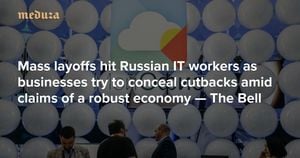2025 is poised to be a year of remarkable transformation across business and society, with leaders preparing to navigate complex challenges and seize new opportunities. Analysts predict significant disruptions shaped by economic shifts, political uncertainties, and technological innovations.
According to Gartner research, businesses can expect three primary challenges: demands for future-ready workforces, the changing role of managers, and rising talent risks. They anticipate nine key predictions around technology, collaboration, and employee retention, urging leaders to identify trends likely to impact their organizations and to find advantages amid these changes.
The PEST model highlights pressing trends for 2025, particularly surrounding political factors. The return of Donald Trump to the presidential office is expected to reverberate globally through his proposed tariffs on BRICS countries and North America, raising questions about trade dynamics and international relations. Issues concerning NATO, Ukraine, and the Asia-Pacific area could lead to destabilizing effects, creating what some analysts term the 'G-zero world,' where no single entity leads the global agenda.
Simultaneously, several notable national elections are set for 2025, likely reshaping political landscapes worldwide. Germany will hold parliamentary elections, following the collapse of the coalition government, and Australia will vote for its federal government. Other countries, from Poland and Canada to Israel, will also see leadership changes, each influencing global political currents.
On the economic front, moderate global growth is projected, with inflation rates expected to decline. Central banks worldwide may begin normalizing monetary policies, resulting in modest growth particularly for the US and EU. The specter of Trump’s tariffs can, nevertheless, impact global trade and economic conditions, leading to potential retaliatory measures and fostering fears of 'Western decoupling' from China.
May also see the rise of alternative currencies, as countdowns to potential tariffs raise the allure of crypto alternatives to the US dollar. Observers are noting how the geopolitical climate may favor new currencies, especially as BRICS nations explore the possibility of gold-backed digital currency. This could challenge the traditional financial status quo.
Turning to society, increasing dissatisfaction amid rising living costs and immigration concerns is driving more short-term policy decisions. Investment firm BlackRock expects to see governments intent on quickly addressing these public sentiments, potentially leading to populist policy shifts. This environment can create fertile ground for sudden, reactive legislative changes as incumbents strive to hold onto their positions.
Corporate communications are also undergoing drastic transformations. The Chief Corporate Communications Officer at EHL observes the necessity of integrating digital tools with human-centric strategies as brands increasingly rely on authentic engagements to connect with audiences. Communication now demands audits and rapid adaptation to consumer behaviors, where platforms and algorithms dictate the narrative.
Digital communication channels are set to explode. With 89% of consumers preferring more video content, brands must create agile and visually appealing content, particularly on mobile devices. The expectation for cohesive brand messaging across digital platforms has never been more pronounced, and traditional silos between public relations and digital marketing are blurring.
AI has emerged as both friend and foe, unlocking efficiencies but raising ethical concerns surrounding content authenticity. The backlash against AI-generated advertisements highlights the growing need for brands to navigate this complex terrain thoughtfully. Companies must prioritize transparency and authenticity, balancing the use of AI with original content creation.
Renewable energy sources are also positioned for significant shifts. Enthusiasm for nuclear energy, dampened by past controversies, is building again with plans for new reactors underway, highlighting the need for cost-effective solutions amid tight budgets. Small modular reactors (SMRs), which promise lower costs and quicker deployment, are at the forefront of this resurgence. Despite the challenges, studies show numerous reactors under construction worldwide, from China to various countries across Europe.
Date estimates indicate renewable production will surge by 250 GW, surpassing coal as the primary electricity source, though Europe will face hurdles. A decreasing economic outlook, high interest rates, and delays are raising concerns over the renewable projects’ viability, necessitating investors to prioritize quicker returns on their investments.
The global power grid remains the biggest challenge for transition efforts, with substantial investments needed to upgrade infrastructure. AI technology and predictive maintenance solutions are being touted as ways to address these needs, yet major public and private investment is still required to manage tomorrow's energy demands.
Looking at ecological forecasts, 2025 is set to be one of the warmest years recorded. Water scarcity concerns may push global initiatives aimed at conservation to the forefront. Investments in technology are anticipated, with solar-powered desalination plants becoming more commonplace amid rising droughts.
Lastly, the societal trend toward physical experiences and community building will continue. After years of digital reliance, many are embracing local connections and experiences, highlighting the need for businesses to adjust their strategies accordingly to cultivate meaningful relationships with consumers.
With all these developments converging, the urgency for businesses to adapt has never been higher. Companies must be ready to innovate, respond to climate challenges, and align corporate strategies with social and psychological changes. 2025 is not merely about the challenges—it’s also about countless opportunities for those agile enough to seize them.



